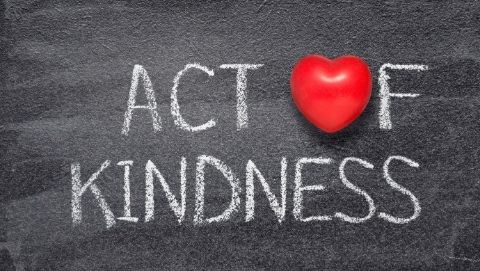Improve Mental Health with Acts of Kindness
By Extension Assisant Professor, Christina Pay

In today’s world of negativity kindness is needed more than ever. Kindness has been defined simply as the state or quality of being kind. Taking a look at the synonyms for kindness we find more depth in words such as benevolence, generosity, charity, sympathy, compassion, and tenderness. Kindness entails putting someone else’s needs before our own. For some, putting others first comes easily, for others, it becomes a deliberate effort.
Aesop, the Greek storyteller, has been credited with saying, “No act of kindness – however small – is ever wasted.” It turns out he was right. Acts of kindness not only benefit those in receipt of kind deeds but science has proven that there are astonishing health benefits for those performing those acts and, even to those simply witnessing acts of service. Reported benefits to physical health include increased lifespan, more energy, reduced pain and lower blood pressure. Mental health benefits show increased feelings of community, empathy, compassion and gratitude may occur. Additional mental health benefits for those performing acts of kindness include:
- Reduced stress and anxiety. Performing acts of kindness releases oxytocin, the feel-good hormone, which increases self-esteem and optimism. This, along with decreased levels of cortisol help reduce stress and anxiety and can lift your mood. (McCraty, et al., 1998)
- Improved resiliency. Increased feelings of happiness and peace, as well as stronger immunity help with resiliency because they strengthen the ability to stay grounded during difficult times. With a boosted immunity the body is kept healthy and able to ward off disease. Even just witnessing acts of kindness increases the body’s immunity. Serotonin is also increased which regulates mood in the brain and builds resilience. (Breazeale & Steinberg, 2012)
- Increased pleasure. Kindness to others releases endorphins in the body that lights up the pleasure center in the brain. This phenomenon is known as the “helper’s high “and makes the giver feel as if they were the recipient of the good deed, not the giver. (Baraz & Alexander, 2010)
- Reduced depression and greater well-being. When we give of ourselves, everything from life satisfaction to self-realization (the fulfillment of one’s own potential) is improved. Additionally, physical health improves significantly, mortality is delayed, and depression is reduced. Feelings of well-being, that of feeling healthy, happy and positive, as well as, good fortune, as in feeling positivity and good luck are also increased. (Post, 2005)
We all need kindness and we all have the ability to be kinder. Even small acts of kindness can change the world and our own mental health. Need ideas to help you begin? Random Acts of Kindness, a non-profit organization dedicated to kindness education, has suggestions, ideas and even monthly calendars to help anyone increase kind acts. Examples include:
- Ask a senior citizen about their past.
- Leave quarters at the laundromat.
- Find out something new about a co-worker.
- Text someone good morning or good night.
- Compliment drivers on how well they parked.
- Praise a local business online.
Performing small acts of kindness isn’t difficult nor necessarily time consuming. Try a little harder each day to increase your acts of kindness. You will be astonished at how good it will make you feel.
References
- Random Acts of Kindness https://www.randomactsofkindness.org/
- Kindness Health Facts https://www.dartmouth.edu/wellness/emotional/rakhealthfacts.pdf


 Utah 4-H & Youth
Utah 4-H & Youth